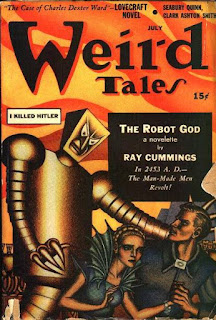The New Bedford Whaling Museum's Moby-Dick Marathon is an annual non-stop reading of Herman Melville's literary masterpiece. The multi-day program of entertaining activities and events is presented every January. Admission to the Marathon is free.
Saturday, March 10, 2018
The Amazing Internet
In 1935, George Bernard Shaw remarked that thanks to the radio, he could hear more good music in a week than he could have heard "in ten years, if at all," back in the 1880s when he was writing music criticism in London. Shaw's startling demonstration of the cultural impact of technology often recurs when I think about everything the Internet makes available today.
As recently as twenty years ago, you would have had to turn to the best university libraries if you wanted to consult the enormous mass of printed material you can now read, wherever you are (just about), with a few keyboard taps. Earlier this week, while rereading the selection in the Norton Critical Edition 2nd from a 1992 paper by Geoffrey Sanborn, I wanted to take a look at the 1823 review essay by Sir Francis Palgrave, "Superstition and Knowledge," that Sanborn shows was one of the minor tributaries feeding into Melville's mind as he toiled over Moby-Dick. After two or three minutes of searching, I found the very thing, starting at page 245 of this collection of Palgrave's writings. Not only was it fast; I could save it as a searchable PDF for future reference. And no scrounging for coins to feed into a smelly library copying machine.
I well remember how excited I was, in the early 1990s, to learn that the nearest state university library had a full set of Robert Southey's The Doctor, which is often mentioned as a possible inspiration (in form) for Moby-Dick. But now Southey's work is at my fingertips, at any time and from time to time.
And just take a look at this, courtesy of Harvard and Mr. Google. O brave new world, that has such resources in 't!
Subscribe to:
Post Comments (Atom)

No comments:
Post a Comment